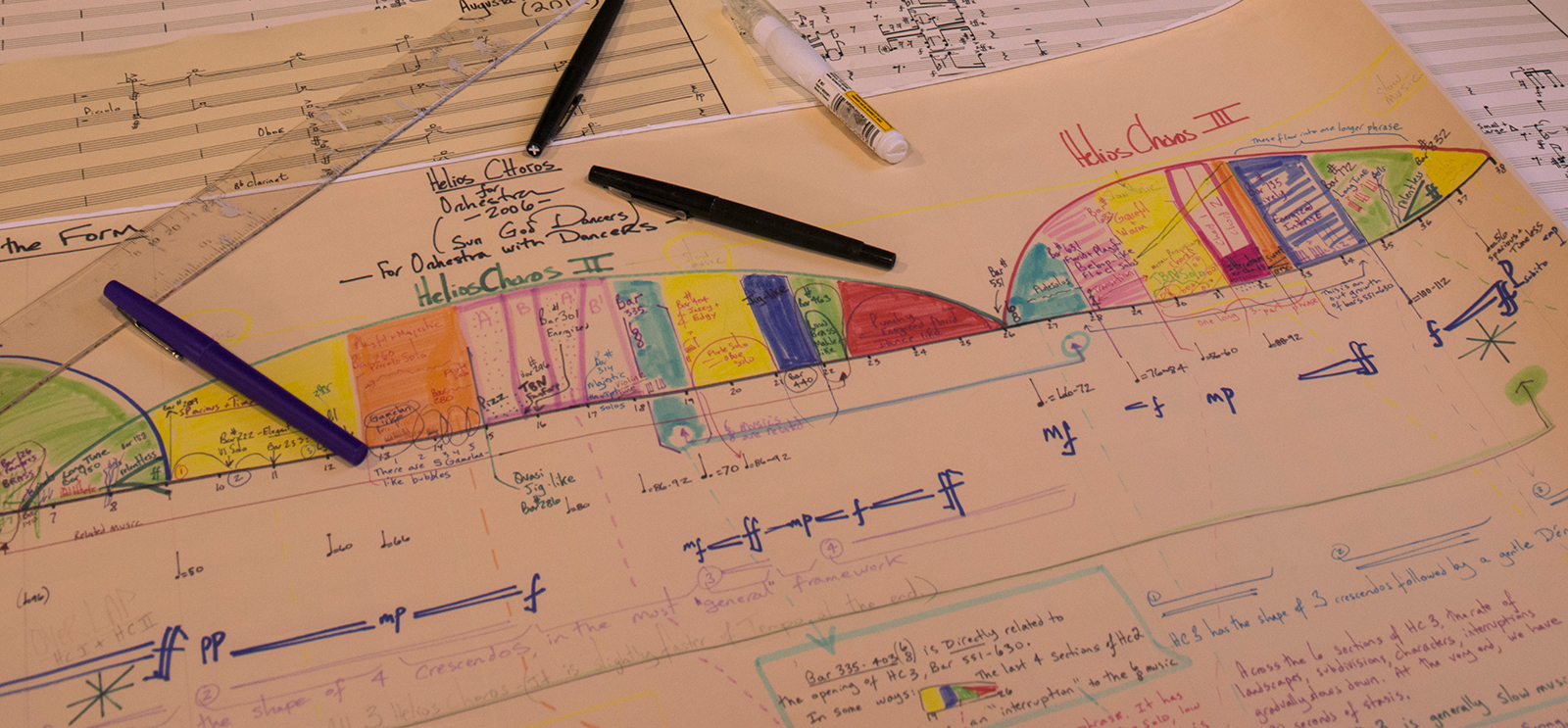
For the Ear Taxi Festival, October 5–10, 53 composers are at work on world premieres.
The Ear Taxi Festival will highlight contemporary classical music in Chicago.
Augusta Read Thomas’s right hand slides from an A to a B to an E-flat on her glossy black Steinway B. The sketch she’s playing from is exactly that—a bunch of open circles kissed by erratic scribbled lines on the makeshift score she’s written. It could be a minute’s worth of music, or it could be a rough map of the solar system, if you close one eye.
The music, whipped up this morning, is in its earliest and roughest form, still just a newborn in its life as a composition. Meanwhile, another of Thomas’s creations, dreamed up three years ago, is about to come to fruition. The Ear Taxi Festival, taking place October 5–10 at six venues across the city, will celebrate Chicago’s vast and vibrant contemporary classical music scene.
Led by Thomas and co-curated by renowned trumpeter Stephen Burns, the festival will feature the work of some 300 musicians along with lectures, installations, and artist meet and greets. “I’m going to take your ears on 95 cab rides,” says Thomas, University Professor of Composition at UChicago and one of today’s most distinguished composers. According to the American Society of Composers, Authors, and Publishers, a performing rights group, her musical works were performed more frequently in 2013–14 than those of any other living American.
Fifty-three composers all over the city are at work writing world premiere compositions for the festival. There will be more than three times the number of fresh commissions at last summer’s weeklong Tanglewood festival, another major showcase of contemporary music, put on by the Tanglewood Music Center in Massachusetts. Everyone involved in Ear Taxi has Chicago ties, from the composers and performers to the audio engineers, Thomas says. But that’s about it, as far as similarities go. “If you just come to one evening, you’re going to get such an abundance of different voices, different people, different colors,” she says.
Some of the composers will be influenced by jazz, others by European music, and others still, including Chris Fisher-Lochhead, by popular music. His piece “stutter-step the concept” is inspired by the sampling techniques and full-body engagement of early ’90s hip-hop. There really is something for everyone, and Thomas urges festivalgoers to come with open minds and ears. “Some of the pieces are going to be, metaphorically speaking, purple. And the next piece after it is going to be yellow, and the piece after that is going to be green, and the piece after that is going to be polka-dotted.”
The variety of the Ear Taxi Festival is representative of a paradigm shift taking place right now in American music, says Michael Lewanski. He’s a member of Ear Taxi’s curatorial board and a self-proclaimed “artistic cheerleader” for the festival. He thinks today’s generation of musicians in Chicago wants to write, play, and support art that reflects the world they live in. Lewanski says he loves Beethoven, but “Beethoven was writing for a different time and place.”
Lewanski, assistant professor of instrumental ensembles at DePaul University, will premiere three new works at Ear Taxi as conductor for the 22-member collective Ensemble Dal Niente. “To me the thing about contemporary life is that it’s vast and diverse and confusing. The Ear Taxi Festival is all of that. Not everyone is going to like everything. That’s fine, because that’s how the world is.” For Thomas, the festival is one of many ways she gives back to the art form she loves. She’s been on the board of directors of the American Music Center since 2000 and served as its chair from 2005 to 2008. She has taught at the Eastman School of Music, Northwestern University, and the Tanglewood Music Center and was the 16th person ever to be appointed University Professor at UChicago.
“And 10 other things,” she says with a sweep of her hand. (By “other things,” she might mean creating the burgeoning MusicNOW concert series in 1998 during her residency with the Chicago Symphony Orchestra or helping 10 high-school-aged composers premiere their works with the New Haven Symphony in 2011.)
“I love music of this type. And I like the people who make this music. And this music needs advocates and visionaries and leaders who are willing to work,” she says. The vision isn’t over with Ear Taxi. Thomas is currently working to establish a center for contemporary composition on UChicago’s campus with its own residency, fellowship, and performance programming. It’s both ambitious and, she thinks, a natural progression for a university and city with such rich musical traditions and influence.
Thomas hopes the center will be a place where today’s Debussys come to visit, and where tomorrow’s Stravinskys can be trained and nurtured. But first, many of these future stars will be at Ear Taxi this fall. In fact, Thomas estimates that about 60 percent of the festival’s composers are emerging artists. For many, it’s their first big chance to be heard. It’s an opportunity to have their faces and their stories printed in a 150-page program alongside the musicians who inspired them, or who will inspire them in the future.
“Hopefully I’m helping others to bring the whole culture higher,” Thomas says.
